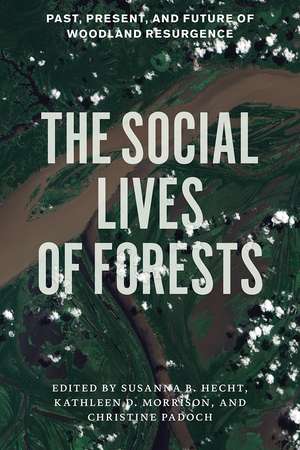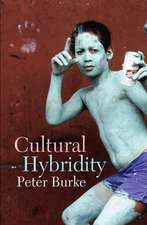The Social Lives of Forests: Past, Present, and Future of Woodland Resurgence
Editat de Susanna B. Hecht, Kathleen D. Morrison, Christine Padochen Limba Engleză Paperback – aug 2016
Forests are in decline, and the threats these outposts of nature face—including deforestation, degradation, and fragmentation—are the result of human culture. Or are they? This volume calls these assumptions into question, revealing forests’ past, present, and future conditions to be the joint products of a host of natural and cultural forces. Moreover, in many cases the coalescence of these forces—from local ecologies to competing knowledge systems—has masked a significant contemporary trend of woodland resurgence, even in the forests of the tropics.
Focusing on the history and current use of woodlands from India to the Amazon, The Social Lives of Forests attempts to build a coherent view of forests sited at the nexus of nature, culture, and development. With chapters covering the effects of human activities on succession patterns in now-protected Costa Rican forests; the intersection of gender and knowledge in African shea nut tree markets; and even the unexpectedly rich urban woodlands of Chicago, this book explores forests as places of significant human action, with complex institutions, ecologies, and economies that have transformed these landscapes in the past and continue to shape them today. From rain forests to timber farms, the face of forests—how we define, understand, and maintain them—is changing.
Focusing on the history and current use of woodlands from India to the Amazon, The Social Lives of Forests attempts to build a coherent view of forests sited at the nexus of nature, culture, and development. With chapters covering the effects of human activities on succession patterns in now-protected Costa Rican forests; the intersection of gender and knowledge in African shea nut tree markets; and even the unexpectedly rich urban woodlands of Chicago, this book explores forests as places of significant human action, with complex institutions, ecologies, and economies that have transformed these landscapes in the past and continue to shape them today. From rain forests to timber farms, the face of forests—how we define, understand, and maintain them—is changing.
Preț: 264.60 lei
Nou
Puncte Express: 397
Preț estimativ în valută:
50.64€ • 52.54$ • 42.32£
50.64€ • 52.54$ • 42.32£
Carte tipărită la comandă
Livrare economică 17-31 martie
Preluare comenzi: 021 569.72.76
Specificații
ISBN-13: 9780226322681
ISBN-10: 0226322688
Pagini: 507
Ilustrații: 34 halftones, 19 tables, 13 line drawings
Dimensiuni: 152 x 229 x 30 mm
Greutate: 0.67 kg
Editura: University of Chicago Press
Colecția University of Chicago Press
ISBN-10: 0226322688
Pagini: 507
Ilustrații: 34 halftones, 19 tables, 13 line drawings
Dimensiuni: 152 x 229 x 30 mm
Greutate: 0.67 kg
Editura: University of Chicago Press
Colecția University of Chicago Press
Notă biografică
Susanna B. Hecht is professor in the Luskin School of Public Affairs and the Institute of the Environment and Sustainability at the University of California, Los Angeles, and author of The Scramble for the Amazon and the “Lost Paradise” of Euclides da Cunha. Kathleen D. Morrison is the Sally and Alvin V. Shoemaker Professor of Anthropology and department chair at the University of Pennsylvania. She is the author or editor of several volumes, including Daroji Valley: Landscape History, Place, and the Making of a Dryland Reservoir System. Christine Padoch is the research director of forests and livelihoods at the Center for International Forestry Research, Indonesia.
Cuprins
List of Illustrations Acknowledgments
1 From Fragmentation to Forest Resurgence: Paradigms, Representations, and Practices · Susanna B. Hecht, Kathleen D. Morrison, and Christine Padoch
PART I. CONCEPTUAL FRAMEWORKS
Rethinking Social Lives and Forest Transitions: History, Ideologies, Institutions, and the Matrix · Susanna B. Hecht
2 False Forest History, Complicit Social Analysis: Rethinking Some West African Environmental Narratives · James Fairhead and Melissa Leach
3 Stories of Nature’s Hybridity in Europe: Implications for Forest Conservation in the Global South · Roderick P. Neumann
4 Adam Smith in the Forest · Fredrik Albritton Jonsson
5 Jungles, Forests, and the Theatre of Wars: Insurgency, Counterinsurgency, and the Political Forest in Southeast Asia · Nancy Lee Peluso and Peter Vandergeest
6 Mutant Ecologies: Radioactive Life in Post–Cold War New Mexico · Joseph Masco
7 Pan-Tropical Perspectives on Forest Resurgence · Alan Grainger
8 The Social Lives of Forest Transitions and Successions: Theories of Forest Resurgence ·Susanna B. Hecht
9 Paradigms Lost: Tropical Conservation under Late Capitalism ·John Vandermeer andIvette Perfecto
10 Effects of Human Activities on Successional Pathways: Case Studies from Lowland Wet Forests of Northeastern Costa Rica ·Robin L. Chazdon, Braulio Vilchez Alvarado, Susan Letcher, Amanda Wendt, and Uzay Sezen
PART II: HISTORICAL ECOLOGIES
Human-Forest Relationships and the Erasure of History ·Kathleen D. Morrison
11 Constructing Nature: Socio-Natural Histories of an Indian Forest ·Kathleen D. Morrison and Mark T. Lycett
12 Culturing the Rainforest: The Kelabit Highlands of Sarawak ·Monica Janowski, Huw Barton, and Samantha Jones
13 Residual Effects of Agroforestry Activities at Dos Hombres, a Classic Period Maya Site in Belize ·David L. Lentz and Brian Lane
14 Forest as Faunal Enclave: Endangerment, Ecology, and Exclusion in India ·Mahesh Rangarajan
15 Amazonia: The Historical Ecology of a Domesticated Landscape ·Clark L. Erickson
PART III: MARKET DYNAMICS
Market Dynamics and Regional Change ·Nicholas K. Menzies
16 The Fate of the Branded Forest: Science, Violence, and Seduction in the World of Teak ·Raymond L. Bryant
17 Gendered Knowledge and the African Shea-Nut Tree ·Judith Carney and Marlène Elias
18 Ancient Forest Tea: How Globalization Turned Backward Minorities into Green Marketing Innovators ·Nicholas K. Menzies
19 The Production of Forests: Tree Cover Transitions in Northern Thailand, Northern Laos, and Southern China ·Jefferson Fox
20 From Swidden to Rubber: Transforming Landscape and Livelihoods in Mountainous Northern Laos ·Yayoi Fujita Lagerqvist
PART IV: INSTITUTIONS
Institutions: The Secret Lives of Forests ·Susanna B. Hecht
21 A Forest for My Kingdom? “Forest Rent” and the Politics of History in Asante (Ghana) ·Sara Berry
22 The Invisible Map: Community Tenure Rights ·Deborah Barry and Ruth Meinzen-Dick
23 Re-Greening the Sahel: Linking Adaptation to Climate Change, Poverty Reduction, and Sustainable Development in Drylands ·Chris Reij
PART V: THE URBAN MATRIX
Urban Ecologies ·Christine Padoch
24 Amazonia 1492: Pristine Forest or Cultural Parkland? ·Michael J. Heckenberger, Afukaka Kuikuro, Urissap’a Tabata Kuikuro, J. Christian Russell, Morgan Schmidt, Carlos Fausto, and Bruna Franchetto
25 Urban Residence, Rural Employment, and the Future of Amazonian Forests · Christine Padoch, Angela Steward, Miguel Pinedo-Vasquez, Louis Putzel, and Medardo Miranda Ruiz
26 From Fallow Timber to Urban Housing: Family Forestry and Tablilla Production in Peru ·Robin R. Sears and Miguel Pinedo-Vasquez
27 Forest Resources, City Services: Globalization, Household Networks, and Urbanization in the Amazon Estuary ·Eduardo S. Brondizio, Andrea D. Siqueira, and Nathan Vogt
28 Chicago Wilderness: Integrating Biological and Social Diversity in the Urban Garden ·Peter Crane, Liam Heneghan, Francie Muraski-Stotz, Melinda Pruett-Jones, Laurel Ross, Alaka Wali, and Lynne Westphal
Recenzii
“With twenty-eight chapters and 500 pages, this is a dense book—and a valuable and welcome one. . . . Compared to many earlier works, this book’s strength and original contribution is about going much deeper on the description and explanation of the human and social forces that lie behind these ‘novel ecosystems.’ . . . The ecology of disturbed forests is of course a fundamental issue, but here we have a strong, multidisciplinary, multi-focused work which definitely establishes that social forces giving rise to human-modified forests cannot anymore remain a fringe topic in sustainability sciences. This book is a valuable reader for scholars and students interested in political ecology, restoration ecology, land change science, and, more broadly, studies of social-ecological systems.”
“Through careful editorship, in particular the introductions to each of the book’s five parts, Hecht, Morrison, and Padoch show how a social science approach to forests necessarily covers a large number of issues, from those that are purely theoretical or conceptual, to those that are more policy-orientated. The twenty-eight chapters, all written by authors of leading works on tropical and temperate forests, seek to debunk once and for all a number of popular and scientific myths concerning the relationship between forests and peoples. . . . There is no doubt that this rich volume represents an excellent and lasting introduction to the social lives of forests in the contemporary world.”
“Reiterates the importance of understanding both manmade and natural changes in forested landscapes before conservation issues can be effectively addressed. . . . An important book for environmental scholars, practicing ecologists, and conservation biologists, especially those who are working on issues at the interface of human society and natural ecosystems. Development practitioners, activists, and policy makers will also find this book useful to broaden their perspectives on human-nature linkages.”
“Traditional conservation-based approaches seek to separate humans from the environment, but the authors offer a vision of land management based on an understanding of human and environmental interactions occurring in a rich, interspersed matrix. This understanding has important implications for future forest management that seeks to balance carbon sequestration, biodiversity conservation, and human use. The depth of scholarship and the interdisciplinary approach make this work an important contribution to the subjects of forest management, conservation, ecology, and environmental history. . . . Highly recommended.”
“A common thread in The Social Lives of Forests is a criticism of nature set-asides as the default conservation model. . . . More people doesn’t necessarily mean less forest and never has. . . . These are contentious, even radical, arguments.”
“A new book of essays, by academics from several nations, . . . attempts to reverse the conventional wisdom about the state of the world’s forests. The Social Lives of Forests . . . captures an emergent trend in research: that while deforestation does occur, there is roughly as much reforestation occurring. While the writers say more work needs to be done, they say that so far, the evidence either for or against net deforestation is inconclusive. This, of course, has implications for forestry and agricultural policy.”
“The Social Lives of Forests offers sophisticated, positive perspectives on forests around the world. The authors’ stimulating ideas address important questions of forest dynamics and management. They also apply to the creation of working landscapes that offer space for people and nature everywhere.”
“The Social Lives of Forests should have a strong and positive influence on the fields of ecology, conservation, environmental history, and many social sciences. A clear message emerges that established views and conservation approaches based on seeing people as separate from nature—or viewing the land as divided into the pristine and wild versus the humanized and despoiled—are erroneous and doomed to generate unsuccessful policies and approaches to stewardship. These are not novel ideas, but this volume is unusual and valuable in making a forceful case for their validity based on work from many different landscapes and cultures and a great diversity of environmental and historical conditions.”
“Forests are complex ecological entities, but they are also cultural, historical, political, and social, all at once. Above all, say the contributors to this excellent volume, forests are working landscapes with multiple lives and livelihoods. The Social Lives of Forests brings together a posse of the world’s leading scholars of forests who challenge us to think about trees and people in entirely new ways. This book is an exhilarating and intellectually capacious exploration of forests as biomes and as artifacts. A bravura piece of social science scholarship.”
“Very engaging. The Social Lives of Forests offers a must-read, highly interdisciplinary perspective yielding fresh, rich insight and incisive accounts of a global swath of sustainability issues and politics surrounding forests and their current and future management, markets, policies, cultures, and conservation along with their incredible past histories. A joy.”
“An all-too-uncommon union of the hard and social sciences, The Social Lives of Forests is a groundbreaking work that reframes both the history of the world’s forest lands and the debate over their future. Stressing the centuries-long human role in the creation and maintenance of wooded landscapes, and their relation to both rural and urban life in the globalized world of today and in the past, the articles in this book collectively provide a new way to think about forest ecosystems and their inhabitants. This is a book that will surprise and inform historians, ecologists, foresters, environmentalists—and anyone who cares about the forests around us.”











